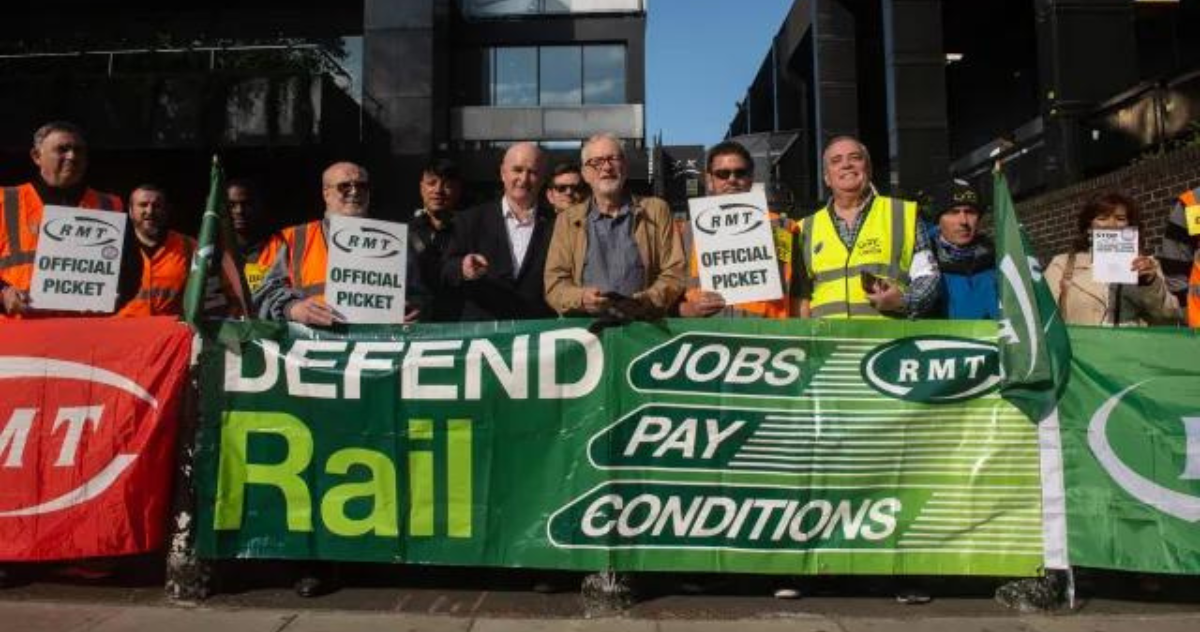London ( Parliament Politics Magazine ) RMT members are set to vote on a proposed pay deal that could put a pause on the ongoing industrial action against train companies. The offer, presented by operators, includes retroactive pay increases and assurances of job security. While RMT leader Mick Lynch expresses support for the deal, the possibility of future strikes is not ruled out.
Additional negotiations are necessary to finalize further pay adjustments and railway reforms. The dispute, lasting nearly 18 months, revolves around workers’ demands for improved job security, pay, and working conditions.
RMT and Train Companies Make Progress in Dispute Resolution Talks
Despite progress, a separate conflict with Aslef union train drivers raises the potential for Christmas walkouts. Talks between RMT and the Rail Delivery Group have led to the development of a memorandum of understanding, outlining a mutually agreed path forward.
The memorandum of understanding (MOU), as per BBC’s understanding, encompasses a retroactive 5% pay increase for 2022, amounting to £1,750, and assurances of job security, including a commitment to no compulsory redundancies until the conclusion of 2024.
The second-year pay adjustment remains contingent on ongoing negotiations for reforms at the local level. The Rail Delivery Group (RDG) stated that if accepted, the MOU would terminate the national dispute mandate, providing a temporary halt to industrial action during the Christmas season and into the spring. This pause allows for crucial discussions on proposed reforms.
Details of Proposed Pay Deal and Job Security Guarantees in RMT’s MOU
RMT leader Mick Lynch expressed a lack of enthusiasm about the deal, emphasizing that potential future strikes could still occur if conditions rejected by the union were imposed. Transport Secretary Mark Harper stressed the importance of avoiding disruptions to the railways in the lead-up to Christmas, especially for the hospitality industry.
Trade body UK Hospitality hailed the development as a “significant breakthrough.” RMT members will participate in an online referendum to vote on the deal, with the voting period closing on November 30. This marks the first deal subjected to a vote since the commencement of the dispute.
Conditional Approval: RMT Leader Expresses Caution Regarding Deal
The Department for Transport has characterized the deal as “fair and reasonable,” emphasizing its role as a positive stride towards resolving the ongoing dispute. RMT members, including guards and ticket office staff from 14 train companies, have actively participated in a series of national strikes since June 2022 as part of this protracted conflict.
These strikes, occurring concurrently with walkouts by train drivers, have significantly disrupted the rail network, causing standstills and impacting major sporting events and music festivals. Notably, a separate dispute between RMT and Network Rail, responsible for managing the UK’s rail infrastructure, was successfully resolved in March of this year when signallers and maintenance workers voted to accept an offer.
Read More: Approximately 40,000 UK Businesses Teetering on the Edge of Insolvency
RMT Union Voted Fpr Rail Strike Mandate for Six Months
Train travelers voted for an additional six months of potential strikes as members of the RMT union have voted in favor of extending industrial action. The labor dispute with rail companies has persisted for nearly 18 months, driven by workers advocating for improved job security, pay, and working conditions.
RMT general secretary Mick Lynch hailed the vote as a “decisive mandate,” with a 63.6% turnout and 89.9% supporting further action. Lynch urged the government, which influences the dispute through contractual mandates on train operating companies, to allow the Rail Delivery Group to present a revised offer for a potential settlement. He warned of renewed strike action if a new offer did not materialize, emphasizing the defense of members’ livelihoods.
Acknowledging the impact of ongoing strikes on passengers, staff, and businesses, the Rail Delivery Group expressed a desire to resolve the dispute. The RDG called on the RMT executive to conclude the conflict and present the deal, which includes job security guarantees and a pay rise of up to 13% for the lowest-paid workers, to its members.
The RMT conducted a ballot involving over 20,000 members across 14 companies, though the turnout was slightly lower compared to May. The proportion supporting strike action also saw a marginal decrease.
It’s worth noting that RMT members employed by Network Rail resolved their parallel dispute during the spring.

